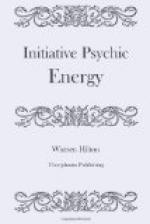[Sidenote: Bodily Effects of Ideas]
For example, the ideas pertaining to any terrifying experience, when recalled to consciousness, bring with them the trembling, the wildly beating heart, the shaking knees, with which they were originally accompanied. The victim of stage-fright feels his knees give way and that he is sinking to the floor; his heart beats tumultuously, cold perspiration covers his body, he blushes, his mouth is dry, and his voice sticks in his throat. Afterwards, alone in his own room, the memory of that dreadful moment, the thought of another appearance before that audience, will be accompanied by the same physiological effects.
[Sidenote: Impulses and Inhibitions]
Every such bodily movement is an expression of energy. The recall to consciousness of the terrifying experience, the recall of the picture of the assembled audience, these things automatically produce bodily activities. So we must conclude that Every idea in memory has associated with it the potential energy necessary for the production of muscular movement.
It does not necessarily follow that the recall to consciousness of a given idea will be invariably followed by an outwardly visible muscular activity expressive of its energy. Just as the mere presence of an idea in consciousness tends to bring about a movement, so the presence of a contrary idea will tend to inhibit it.
Try to imagine that you are bending your forefinger. At the same time hold it straight. Your finger will actually tremble with the dammed-up energy of the repressed impulse. But the finger will not actually move, because the idea of its not moving is just as much a part of your consciousness as the idea of its moving. Put out of your consciousness this thought of the finger’s not moving, and forthwith the finger will bend.
Your conduct during your waking hours is thus always the result of opposing forces, some tending in one direction, others tending to counteract the first. Thus there comes about a great waste of mental power and an appalling loss of individual efficiency.
[Sidenote: Training for Mental “Team-Work"]
In the language of sport, you are suffering from a lack of mental “team work.” The effect is the same as if the members of a football team, instead of combining their forces against the opposing side, should spend their time in restraining one another.
It requires but one step, and not a difficult one at that, to lead you to the conclusion that the solution of this problem lies in having in consciousness at any one moment only such ideas as harmonize. Let that condition prevail, and the potential energies of all ideas in consciousness must flow together in a broad stream of useful and exhilarating activity.
[Sidenote: Rust and the “Daily Grind"]
Your work should be a source of pleasure to you. If it is simply a disagreeable task that has to be performed, if it is a “daily grind,” if you have to hold yourself to it by unremitting effort of the will, you are no better than a rusty engine, and all your workings will be accompanied by jars, frictions, and complaining squeaks that bespeak a positively wicked loss of power.




